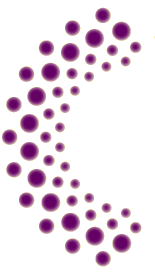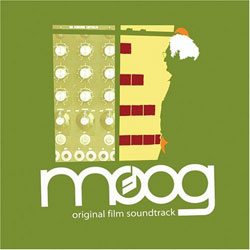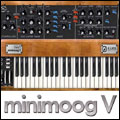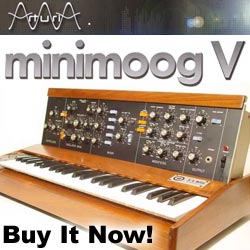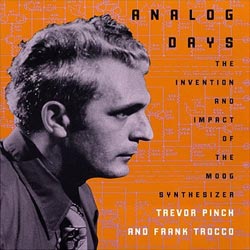|
|
|
|
|
|
|
|
|
|
|
|
|
||||||||||||||||||
 |
|||||||||||||||||||
|
|
|
|
|
March 10, 2005 ../ Arturia MiniMoog VWith our arsenal, some would say museum, of vintage synthesizers, we were very skeptical when Arturia sent us their MiniMoog V softsynth. Coupled with my love for our beloved Model D, I was ready to be a hater and give the MiniMoog V a swift kick in its virtual oscillators. But a funny thing happened on the way to the studio...When I began installing the MiniMoog V on our PowerMac G5 2.0 gHz dualie, I was surprised to be asked what type of wood finish I would like on the virtual unit. Hmmm, interesting. Mahogany sounds nice. I then entered my serial number and the program installed without a hiccup. No challenge codes, no joiners, no hoops of fire to jump through...what a pleasure. I immediately launched the standalone version and watched as my 23 inch Cinema Display filled with an almost exact rendering of my Model D. The graphics were delicious: crisp, easy to read, and very much a perfect emulation of the real thing. Next, I tee'd up a factory bass patch and played a funky line on my controller. Wow! Arturia's MiniMoog V sounded super smooth, yet full. I jumped on my modulation wheel to add some junk to the funk and was taken back by the fluid delivery - something the dodgy mod wheel on my hardware unit was never capable of. After loading one excellent patch after another, my prejudice evaporated and I was in that happy synth place. No wonder Bob Moog has personally endorsed this product, it sounds fantastic. However, great emulations are just the tip of the iceberg with the MiniMoog V. Arturia expanded on the concept with some sophisticated features and enhancements that bring the MiniMoog into the new millennium. The first thing I noticed is that the MiniMoog V is polyphonic, up to 32 voices! Nice!! Next, I discovered a Low Mono setting on oscillator 3's wavelength knob and a sync switch. The Low Mono setting is meant to be used as a modulation source when played polyphonically and the sync switch aligns oscillator 1 to oscillator 2. Another great addition is the soft clipping switch located on the far right. When activated, this feature exponentially increases the MiniMoog V's overdrive quotient giving the sound more definition and grit. Soft clipping is the MiniMoog V's Jedi Power and can be used to create some incredibly aggressive sounds. Other fine additions include Voice Detune control, Voice Unison and the aforementioned Polyphony control. However, Arturia didn't stop there, they added five more stellar attributes. By clicking on the top panel of the MiniMoog V, or the Open button on the top right, the modulation panel tilts upward, like the original, and reveals a user-definable modulation matrix, an additional LFO, an arpeggiator that syncs to MIDI, a chorus effect and a delay! The modulation matrix allows you to really tweak patches by routing source and destination controls to a wide variety of parameters. So you can have your filter cutoff modulate oscillator 2, or the LFO directly control the filter emphasis. With six pairs of source/destination controls, the MiniMoog V enables you to really get crazy. The Arpeggiator is simple, yet has all the controls you need to create great riffs in no time. I found it very helpful designing patches when just using the application in standalone mode. The MiniMoog V is not all gravy and the application does have some shortcomings. First off, if you have an underpowered computer, the MiniMoog V may overwhelm your system when really pushed. especially with Soft Clipping on. Second, the interface is enormous and quite unwieldy when used in conjunction with a sequencer since it masks much of the screen. Arturia really should have created a mini MiniMoog V interface with just the patch list and sound controls. Even an option to lose the keyboard would have cut the interface in have and saved precious screen real estate. Another annoying facet was the fact that when you clicked on the one of the knobs, lets say the cutoff frequency, the sound "jumped" to the new mouse click position instead of smoothly starting to modify the sound from its current setting. Finally, when conducting fast modulation movements, I detected some zippering effects as the sound stepped to the next setting. Notwithstanding, the MiniMoog V is one of the best soft synths out there and certainly the best Mini emulator for the money. You'll not only find that it will become your "go to synth" for basses, but you'll also discover its potential for adding a layer of texture via the soft clipping mode when you stack it with another synth. The Arturia MiniMoog V retails for $199.
The Future: Arturia should tweak its True Analog Emulator
(TAE) technology to be less processor intensive on the next version of the MiniMoog V. Additionally, the interface of the MiniMoog V is gorgeous, but it really needs a "mini mode" for use with sequencers.
We really like the elegant way that Arturia expanded Bob Moog's original vision with the modulation matrix, additional LFO, Arpeggiator and the effects. We hope they continue to add refined features while
staying true to the original concept in the next version.
Required Configuration:

Copyright © 2005 Futuremusic® All Rights Reserved. |
|
|
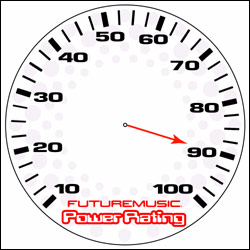 Arturia's MiniMoog V receives a 90% PowerRating - Muscle! We recommend this softsynth to anyone looking for that classic mini sound in a very affordable package!
Now Experiments In Sound has become The Ultimate Mix Contest...
After the tremendous success of our groundbreaking The Next Big Thing DJ Contest, Futuremusic has decided to once again create a new paradigm...
Futuremusic wants to thank everyone who participated in The Next Big Thing 2004. John Digweed, Beatport, Alienware, M-Audio, Native Instruments, IK Multimedia, PVDJ, PK Graphics, Ableton, The DubHouse, Propellerheads, Technics, FreeFloat, The Church, PCDJ and every DJ who entered this year's event thank you. From the sheer number of quality mixes, we can tell you that dance music is thriving in the United States. The amount of outstanding talent and creativity really blew us away, and every DJ who's putting their heart, mind and soul behind the music is a winner. John Digweed has made his decision and the winner is... Think you got skills?? Then start practicing! The Next Big Thing 2005 will kick off at the end of the summer!!
News Archives
|
|
|
|
|
|
|
|
|
|
|
|
|
